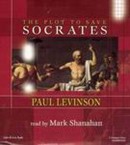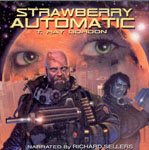
 The Plot To Save Socrates
The Plot To Save Socrates
By Paul Levinson; Read by Mark Shanahan
7 CDs – 10 Hours [UNABRIDGED]
Publisher: Listen & Live Audio
Published: 2006
ISBN: 1593160747
Themes: / Science Fiction / Time Travel / Cloning / Philosophy / Ancient Greece / Ancient Rome / Ancient Egypt / 19th Century New York /
“Think not those faithful who praise all thy words and actions;
but those who kindly reprove thy faults.”
–Socrates (c.470 BC – 399 BC) Greek philosopher2042 AD. Sierra, a young classics scholar has discovered a lost Platonic scroll. Its contents will lead her to attempt to trounce the awful punishment that was imposed upon Socrates, the pre-eminent philosopher of the golden age of Greece. Joining her is her fiance Max, her thesis advisor Tom,
Alcibides (a famous Greek orator and friend to Socrates), 19th century New York publisher
W.H. Appleton, as well as the famously talented inventor,
Heron of Alexandria.
Levinson opens the novel well with grad student Sierra Waters discovering a lost Socratic dialogue. It is a terrific opening, and I think this is what got my hopes so high. This isn’t a terrible novel, it just doesn’t grab me like I wanted it to. It is, rather, a workman-like time travel adventure. I was hoping it would be something deeper. In terms of pace, there is at least one too many characters. And none of them, including Socrates, engaged me as they should have. This is doubly troubling considering that the ideas weren’t sufficent for the novel length. Both the time travel itself and the mechanism of the time travel (a set of chairs created by a mysterious time traveler from the future) are sidelined and remain virtually unexplained. There are some interesting reveals sprinkled here and there and Levinson gives a decent twist-ending but it is only satisfying on one level and doesn’t and fufil the promise I thought it had. I never became enraptured by the story. There are unfilled gaps in the narrative. It feels as if the novel were abridged, though the packaging copy assures me that it wasn’t. The biggest single disapointment for me was the lack of more than a surficial philosophical content. Socrates reasons for allowing himself to be executed by an Athenian jury are only lightly touched upon. Levinson has an interest in philosophy, but Socrates and the Socratic method deserve a stupendous Science Fiction showcase and not this – a light adventure yarn. Had the spartan but solid contents of the plot been rendered to novellete or novella length the story would probably have worked far better. To his credit Levinson includes Socrates’ distrust of the written word. The written word is fixed, something that can’t be quibbled about as easily as can the thoughtful power of spoken word. Had Socrates known about audiobooks I think he’d have questioned the recorded word too.
Narrating duites on this one are by Mark Shanahan. Shannahan has a decent range, offering some distinction between the many characters. His job however was made more difficult than it should have been; Levinson’s characters aren’t fully dimensional. The narration is accompanied by sound effects and a situational background noise. I was disapointed with the inclusion of sound effects. If the text says “the doorbell rang.” you don’t need the sound effect of a doorbell ringing. If the narrator then reads the line “the doorbell rang.” not only don’t you need the sound of a doorbell ringing it interupts the flow of the story to include it. Less intrusive, but certainly no less unnecessary is the occasional inclusion of background noise designed to be appropriate to where a scene takes place. A pub, with a humm of clinking of glasses and the buzz of distant conversations, a seaside with the cry of seagulls and the slosh of waves. I get it, we’re in a pub or on a beach. But the absence from the rest of the narrative makes these scenes stand out in a way they shouldn’t and thus paradoxically distances the listener rather than drawing him or her in. The music is actually pretty good and definitely works better than the rest of the production details. The music fades in and out, bookending scenes. There are also one or two sentences that were missed in the final pass. Shannahan will read a line, and then read it again.
Upon reading other reviews scattered around the net I see that more people seem to have become caught up in the novel than I did. I envy them. I wanted to like this novel a lot more than I did. One reviewer pointed out that Levinson’s characterization and was like that of Isaac Asimov’s. I don’t disagree, I just think that was one of Asimov’s few weakness. Another reviewer pointed out how well constructed the chronology of the time travel was. Again, I don’t disagree, it was well woven. Maybe my problem is that most of my favorite time travel stories are of a much shorter length. If that is your problem too, bear that in mind joining in on The Plot To Save Socrates
Posted by Jesse Willis

 Strawberry Automatic
Strawberry Automatic




 H.G. Wells Collected Science Fiction: The Time Machine & Stories of the Unusual
H.G. Wells Collected Science Fiction: The Time Machine & Stories of the Unusual
